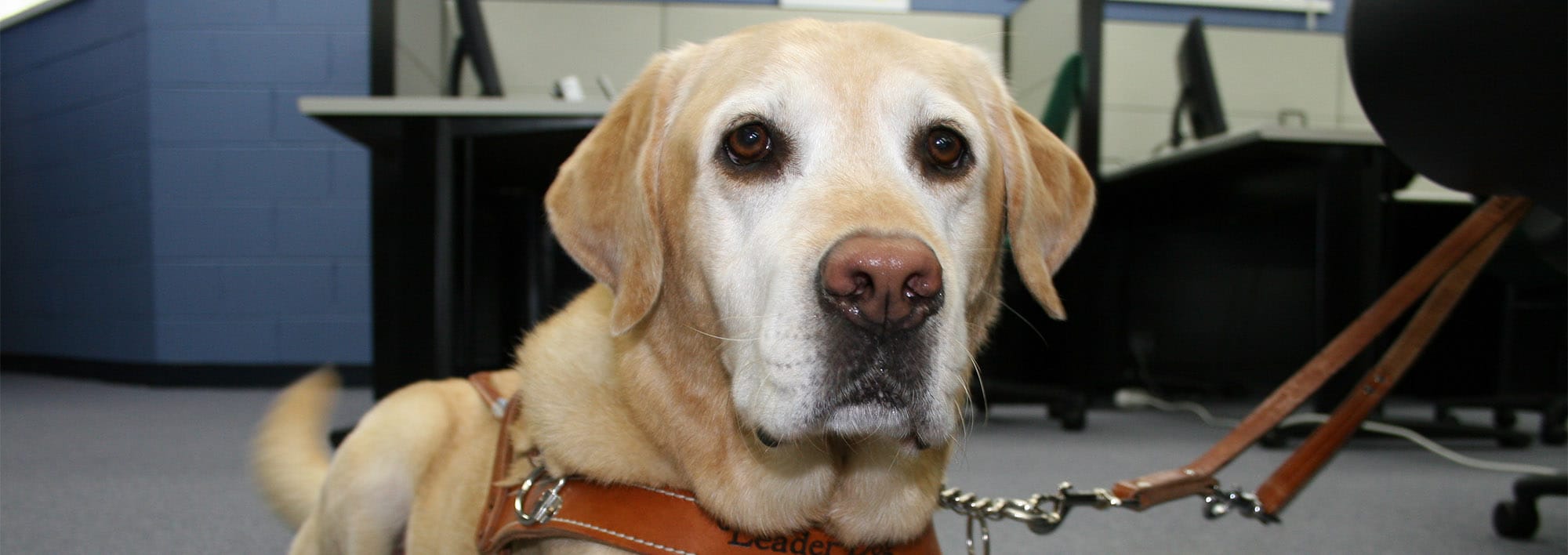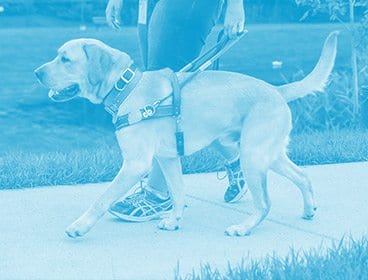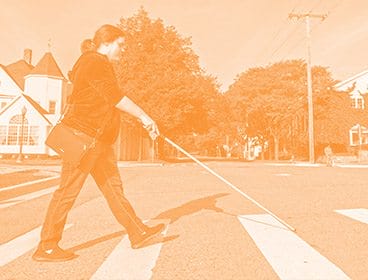
Canine Aging
It's important to pay attention to the changes that your dog undergoes when it ages and make adaptations to help your aging dog live comfortably. Your veterinarian can assist you in identifying changes that may be health concerns. As always, Leader Dog team members are here to help answer your questions.
Most dogs are considered “senior” between 7 and 10 years of age. Large breeds age faster than small breeds. Many breeds experience a graying of their coat as they age, particularly around the muzzle—but there are other, subtle signs that your dog is aging.
Your dog’s hearing may not be as sharp as it once was, its fur may be thinner, and it may take a little longer to get up and moving in the morning. It is perfectly normal for an older dog to sleep more than it used to and to tire more quickly when playing. In a healthy dog these changes occur slowly over time, at a gradual pace that you probably won’t even notice.
It is important that all dogs have an annual checkup or wellness visit with their veterinarian. Regular visits are even more important as your dog ages, so speak with your vet about how often your dog needs a checkup. The American Society for the Prevention of Cruelty to Animals (ASPCA) recommends that healthy senior dogs see a vet every six months.
Make sure the exams are thorough—your vet should listen to your dog’s heart and lungs, take its temperature, examine its skin, fur, ears, eyes, mouth, teeth and internal organs. Your vet may also order routine screening tests for early detection of problems.
Health issues more common in aging dogs include:
- Kidney and liver disease
- Intestinal problems
- Prostate disease and testicular cancer
- Breast cancer and infected uterus
- Diabetes
- Arthritis and degenerative joint disease
- Cognitive problems
- Breathing and swallowing issues
Dogs undergo metabolic and body composition changes as they age. While some of these changes are unavoidable, others can be managed with diet. For this reason, you may want to feed your dog a food formulated for seniors that is lower in fat but not lower in protein. Speak with your vet for a food recommendation based on his/her knowledge of your dog’s health history.
Since smaller dogs live longer and don't experience age-related changes as early as bigger dogs, size is used to determine when it’s time to feed your dog a senior diet. As a guideline, medium breed dogs (21–50 pounds) should change to a senior diet at age 7, large breed dogs (51–90 pounds) should change at age 6. Also, feeding your dog more frequent, smaller meals is easier on its digestive system than one or two large meals per day.
Some vets feel that aging dogs benefit from the addition of dietary supplements, also known as “nutriceuticals.” Common nutriceuticals added to senior food formulas include glucosamine, omega-3 fatty acids, vitamin C, vitamin E, and antioxidants such as vitamin E and beta-carotene. Speak with your vet about whether your dog would benefit from supplements for specific health issues. Make sure the senior food you purchase is for large breed dogs.
Older dogs are unable to regulate body temperature as effectively as young dogs and should be kept warm, dry and indoors when not outside for exercise. Likewise, senior dogs are especially sensitive to heat and humidity and precautions should be taken to protect them from conditions that could cause heat stroke.
Arthritic dogs may appreciate ramps in place of stairs in the home, extra blankets and an orthopedic bed for comfort.
Dogs losing their sight or hearing can be aided by removing obstacles and keeping floors free of clutter.
Excessive tooth plaque can lead to a host of problems and can be reduced by regular brushing with a toothpaste formulated for dogs. However, many senior dogs will require professional cleanings from a vet which is done under general anesthesia.
If you notice anything unusual with your dog, don’t wait for its regularly scheduled checkup to see your vet. Call right away. Symptoms to watch out for include incontinence, lumps, constipation or diarrhea, shortness of breath, coughing, weakness, unusual discharges, changes in weight or appetite, difficulty swallowing food, changes in urination or water intake, stiffness or limping, increased vocalization, and uncharacteristic aggression or significant behavior change.



